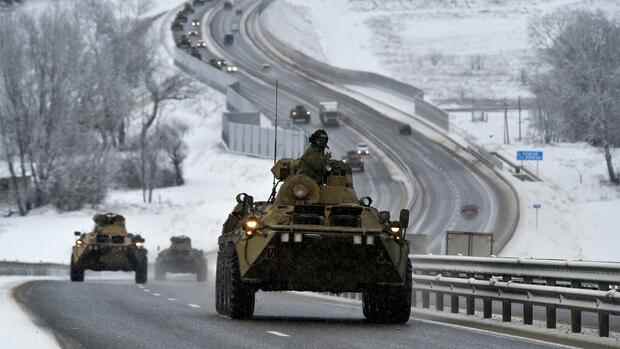Russia has massed an estimated 100,000 troops with tanks and other heavy weapons near Ukraine in what the West says could be the prelude to an invasion.
(Photo: dpa)
The Ukraine-Russia conflict is gripping the world. Hardly a day goes by without new developments, new talks or new provocations.
The past day makes this clear. For example, the heads of state and government of the USA and its European allies called on Russia to take visible steps towards de-escalation.
In addition, the US government placed around 8,500 soldiers in the United States on increased readiness. NATO is also considering moving more combat troops to Eastern Europe, and the EU is planning to support Ukraine with aid worth billions.
This begs the question: How will things continue? Above all, Europe is at the Russia-Ukraine Crisis in a delicate situation: on the one hand, it is necessary to defend one’s own democratic values. On the other hand, it is important not to further deteriorate relations with Russia.
Is there a way out of this dilemma? Should a path of hardness or diplomacy be taken? What role can and should the EU and Germany play? Write us your opinion in five sentences [email protected]. We will publish selected articles with attribution on Thursday in print and online.
Top jobs of the day
Find the best jobs now and
be notified by email.
The background of the conflict
Russia’s President Vladimir Putin is calling for a ban on including other Eastern European and Scandinavian states in the military alliance and for NATO troops to be withdrawn to their 1997 positions, i.e. before the alliance’s eastward expansion.
In addition, the Kremlin accuses Ukraine of preparing a military strike in the east of the country. In order to emphasize its demand, the Kremlin has deployed 100,000 Russian soldiers, along with tanks and artillery, to the border with Ukraine.
On the other hand, the USA, the EU and Great Britain, for example, condemn this approach. Again and again we hear that any further aggression would lead to “massive consequences”.
>> Also read the big Handelsblatt report on the Ukraine crisis: How Putin is challenging the West – and why he could be successful with it
However, the parties involved have not yet agreed exactly what these consequences would look like. In the meantime, there was the idea of cutting off Russian banks from the payment service provider Swift and thus from global financial flows. But this option was quickly discarded.
Germany in conflict of interests
On the part of the Europeans and Germany, the dependence on Russian gas plays a major role in all these speculations. To ensure that these countries do not suddenly find themselves without the necessary energy resources, the US government is said to be working on a concept for Europe’s emergency supply. However, it is questionable whether that would be enough.
Then there is the Nord Stream 2 Baltic Sea pipeline, which has long caused displeasure between Germany and the USA. The US would like to use them as leverage in the Russia-Ukraine conflict.
German politicians do not agree on this point. Federal Defense Minister Christine Lambrecht, for example, said that Nord Stream 2 should not be drawn into the conflict with Russia. It has to be regarded as a private-sector project.
But Foreign Minister Annalena Baerbock (Greens) sees it differently than does the Secretary General of the Liberals, Bijan Djir-Sarai: “Of course there is a political dimension,” he said. The fact that Germany often insists on going its own way is now irritating the other countries involved.
In any case, the talks should be continued for the time being. On Wednesday, representatives of Russia, Ukraine, France and Germany apparently want to exchange ideas again. It remains to be seen whether there will be any progress then.
If you would like to have your say on this topic in the Handelsblatt, write us a comment, either by e-mail [email protected] or on Instagram at @handelsblatt.
This week, the Bundestag is discussing the introduction of a general obligation to vaccinate. The Handelsblatt readership also recently discussed whether this would be a sensible measure.
